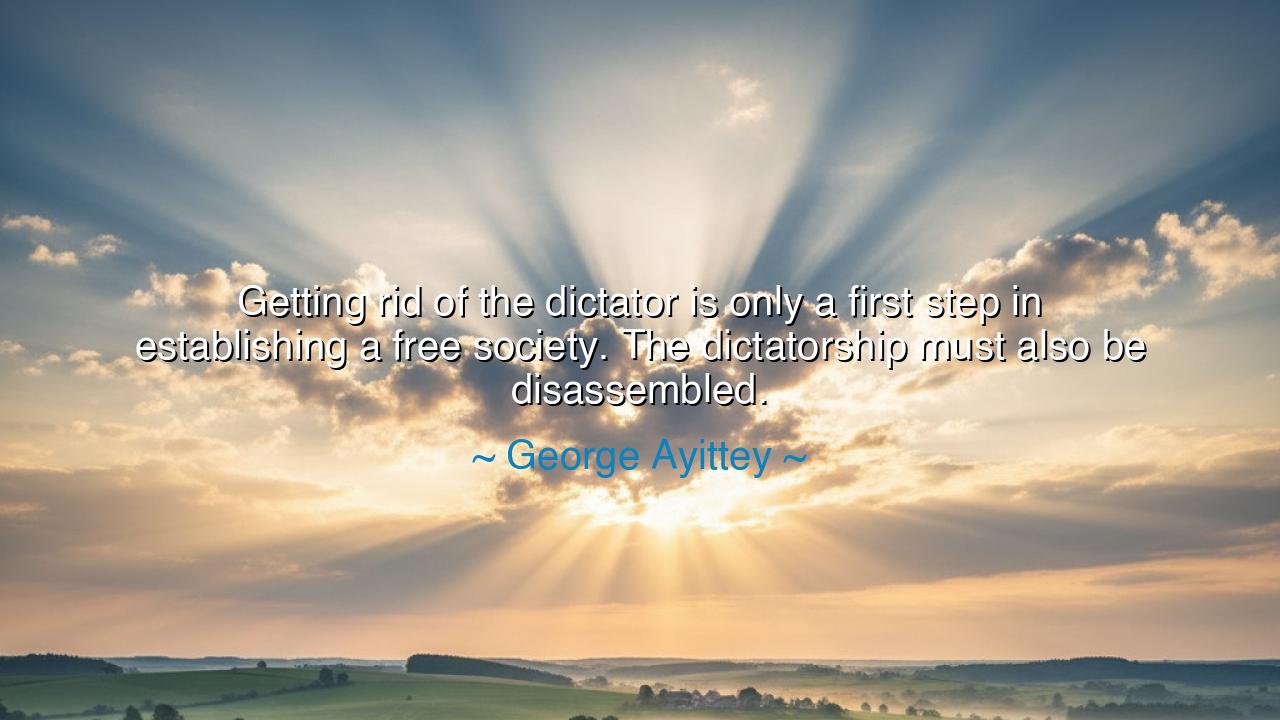
Getting rid of the dictator is only a first step in establishing
Getting rid of the dictator is only a first step in establishing a free society. The dictatorship must also be disassembled.






Hear, O seeker of freedom, the solemn warning of George Ayittey: “Getting rid of the dictator is only a first step in establishing a free society. The dictatorship must also be disassembled.” These words are not idle reflections, but lessons drawn from the wounds of nations. For too often has the tyrant been toppled, and yet the chains of oppression remained. The throne may be emptied, but if the palace of tyranny still stands, it will only call forth another despot to take its place.
Understand this truth: a dictator is but the face of a deeper sickness, the embodiment of a structure built upon fear, silence, and corruption. Remove the man, and the shadow still lingers. The laws twisted to serve power, the armies trained to obey blindly, the courts that bend to oppression, the citizens taught to bow their heads—these are the roots of dictatorship. To strike down the tyrant without cleansing the soil is to invite the same poison to grow again.
Remember the tale of the French Revolution, when the people rose with fire and blade against the monarchy. The king was overthrown, yet the dream of liberty soon gave way to the terror of Robespierre, and not long after, to the iron hand of Napoleon. Why? Because though the dictator was gone, the machinery of domination remained. Power unbridled, institutions unguarded, and the hunger for control unquenched—these are the remnants that can betray a revolution. Thus, Ayittey speaks as one who knows that true freedom is more than the fall of a ruler; it is the dismantling of the very edifice of tyranny.
Look also to the lands of Africa, from which Ayittey himself spoke. Many nations cast off the yoke of colonial masters only to see their hopes devoured by homegrown strongmen. Mobutu in Zaire, Idi Amin in Uganda, Mengistu in Ethiopia—each arose after liberation, clothed in promises of renewal, but perpetuating the same cycle of dictatorship. The flag may change, the anthem may be rewritten, but unless the institutions of oppression are broken apart, the people remain unfree.
This is the lesson: freedom is not an event, it is a labor. To build a free society, the people must not only rejoice in the fall of the tyrant but also take up the patient, often painful work of reform. Courts must be made just, armies must be placed under law, and citizens must be taught to speak without fear. Otherwise, liberty becomes a brief flame, extinguished by the winds of the old order, rising again in new form.
Therefore, let no one be deceived by the sudden fall of a single man. Let the youth understand that the fall of a dictator is but the trumpet announcing the beginning, not the end, of struggle. The harder task is to tear down the pillars of oppression and to raise in their place the foundations of accountability, transparency, and justice.
What, then, must you do in your own life? Wherever you find tyranny—whether in the nation, in the workplace, or in the silence of your own heart—do not be content merely to resist the person who wields unjust power. Seek also to undo the systems, the habits, and the fears that give that power its strength. Build trust where there was suspicion. Share voice where there was silence. Strengthen fairness where there was corruption. These are the bricks of a free society.
And let this be the enduring teaching: that freedom is not secured by the fall of one man, but by the rise of a people. Guard not only against the tyrant’s return but against the tyranny that sleeps in the hearts of men and in the institutions of power. Break down the dictatorship, root and branch, and in its place, raise a new house where justice and liberty dwell. Only then shall the promise of freedom endure for generations.






AAdministratorAdministrator
Welcome, honored guests. Please leave a comment, we will respond soon